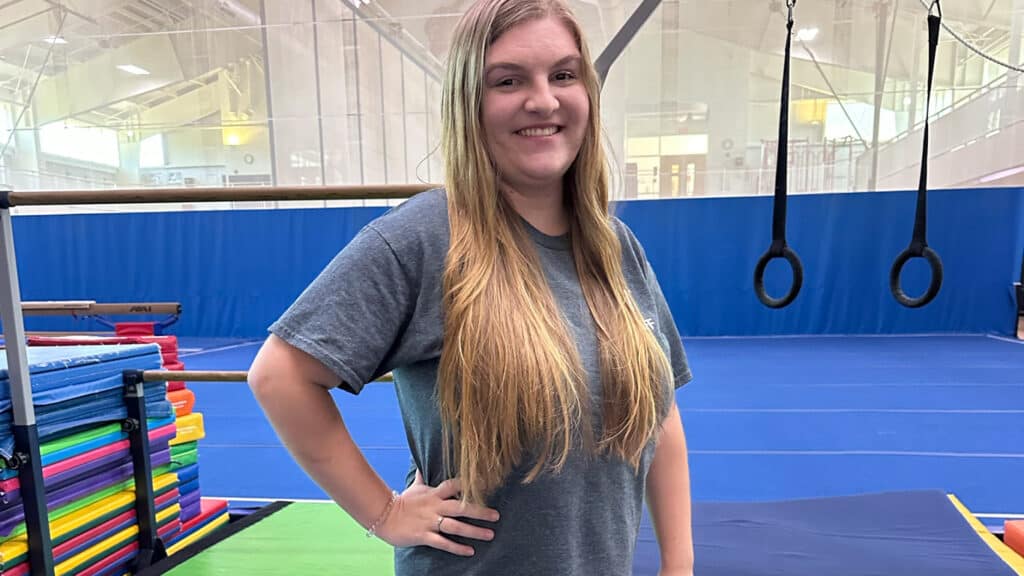Age: 26
Resides: Rindge, NH – Born and raised.
Likes: Piano, gymnastics, her dog Skyler Joy, and the Y!
Eat. Sleep. Gymnastics.
Emily Killmer, the Y’s Gymnastics Head Coach, has established herself as a gymnastics nerd and she has the Instagram feed to prove it.
“I don’t go on Instagram for entertainment anymore I go on it for gymnastics. My whole [feed] is all gymnastics drills and it’s just so satisfying,” she said. “I’ll go home and be like ‘I need to find a drill for this’ and go on Instagram.”
Our Staff Spotlight shines on Emily this week and her passion for gymnastics.
Before joining the staff at the Keene Family YMCA 6 months ago, Emily coached gymnastics through college at the Clark Memorial YMCA in Winchendon, MA, and before that, was in the gymnastics program as a kid there.
She stopped doing gymnastics at about 12 years old, and started to pursue a love of music, learning how to play piano, guitar and ukulele. She joked saying she can play her string instruments when she doesn’t have fake nails on.
“I would say you can’t do gymnastics when you’re old and decrepit, but you can play piano for a long time,” she said with a laugh. “It’s a good secondary hobby.”
The self-proclaimed gymnastics nerd has a particularly fun time on her hands as she looks forward to meets, both coaching and watching.
“I’m excited for this year because we have the Olympic trials and everything. I like looking at all the different angles, the strength component and the mental component,” she said.
Gymnastics may look easy, but Emily wants to remind people that gymnastics is just as much a mental sport than it is a physical one. Going backwards, upside down, and in the air on a beam is not something one can do without the right amount of grit.
“That’s why I enjoy coaching [gymnastics] too because it’s not just the physical stuff it, but it’s also the mental toughness you need to have to go backwards on a 4-inch beam,” she said. “You can do it, but you have to tell your brain you can do it.”
Emily loves to coach gymnastics. She previously worked for 2 years as a Spanish teacher but ended up leaving the position. She found the job at the Y for a head coaching position, and she jumped at the opportunity to do what she loves full time.
“I remember someone asking me ‘what’s your dream job?’ and I was like ‘If I could just be a gymnastics coach full time,’” she said with a laugh. “I was online just looking for different jobs and I found this one and I was like ‘oh my goodness!’”
Emily coaches a few of the team programs here at the Y, but a highlight of her day is the chance she gets to coach the younger kid classes.
“I coach one of my little baby kid classes which is fun for me because I usually work more with the older kids, so I get that one little class with the kinder kids so that’s fun to see and to do,” she said.
If you’re not familiar with gymnastics, practices take a lot of repetition and a lot of coach assistance and spotting for new skills. Emily attended a gymnastics conference this past summer, where one of the clinics was about how coaches can spot better and make practicing new skills safer for the athletes.
Spotting the athletes is a key part of the success of their routines.
“I really enjoy the introductory team programs… just because they’re so excited to be here and they’re learning new things and they’re small enough that I can do a lot of spotting and that’s really fun,” she said. “It’s fun for me with the littler ones because it’s a lot more hands-on spotting and shaping their skills.”
Since a shift in the coaching staff, Emily saw a drop in the number of athletes on the Y’s team. She hopes that over the next few seasons, the staff can build up younger kids to grow into the team.
“I would love to try and get some of those littler kids from those little kid’s classes,” she said. “It would be exciting to start them younger and get them up.”
A key part of Emily’s coaching style is ensuring that her athletes are not just flourishing physically with their skills, but mentally, on and off the floor. She said the team started doing a journal prompt before practice starts so she can check in on her athletes.
“There’s been a lot of poor press around gymnastics, especially with the past couple Olympic cycles, so I really try to change the whole [narrative]. It was very much degrading… the pushing of athletes to unhealthy levels,” she said. “I try to take it to the complete opposite side and try to focus on their mental health and have them have fun and not punishing them for a mental block. That’s just a thing that happens, and they’re probably more frustrated about it than anyone else, so when you punish them for that it just makes it worse.”
Making sure her athletes know they are heard is crucial to the success of the team, and Emily as a coach. She makes sure that her athletes can rely on her as a safe person and can go to her for support.
“Obviously, I have expectations and trying to keep everybody safe, but I’m trying to have them feel like they matter and that I care about what they have to say,” she said.
